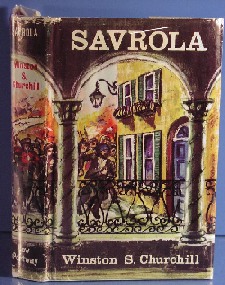
Writings
Great Contemporaries

Winston Churchill, Parliament Square, London © Sue Lowry & Magellan PR
October 17, 2008
Reviewed by H. Ashley Redburn, OBE
Published in Finest Hour 36
Twenty-one studies are included in the original, but the 1938 edition offers a further four which include valuable entries on Fisher, ‘B.-P.,’ Parnell and FDR. All first appeared as articles but WSC softened a few of his original judgments and made amendments as a result of new information. Unhappily, articles on Kitchener and Lloyd George (from the series “Great Men of Our Time”) are omitted, but these and others excluded can be read in “The Collected Essays,” Centenary edition Vol. III.
The central theme of Churchill’s collection is the group of British statesmen who dominated politics at the end of the last and beginning of this century: Balfour, Chamberlain, Rosebery, Morley, Asquith, Curzon. These urbane, erudite, cultured and civilised public men dominated Imperial affairs with a brilliance which contrasts with the drabness of today’s political barbarians. On the whole the book is a valuable study of the course of history in the first four decades of this Century, although one is mystified by the omission of Carson and his influence on the Irish problem. The biographies, mostly about men whom Churchill knew intimately, are of unique value.
Churchill’s wit is never better illustrated than in his essay on the only man of letters included, George Bernard Shaw, whom he treats not as a dramatist but as a strange political creature, “the unique double-headed chameleon, the acquisitive capitalist yet sincere communist . . . the world’s most famous clown and Pantaloon in one.” But there runs through this, and indeed all the pieces, an overriding cordiality and liking for the subject, for Churchill was not a hater. Only once, over Hitler, would he be totally unforgiving. While recognizing its frailties and foolishness he retained compassion and hope for mankind, and he was never cynical. His judgments are of justice, tempered with magnanimity.

2025 International Churchill Conference
In Bargaining for Supremacy (Univ. of Calif Press 1977), James R. Leutze accused WSC of being “oddly unaware of other people’s reactions . . . not much interested in others.” This is a frequent charge, but as these essays testify, WSC had a greater awareness of human nature and regard for human beings than most. The imaginative man does not need to experience poverty in order to understand it. Churchill’s awareness of others is perhaps best demonstrated in his chapter on Philip Snowden, who had been truly reared in poverty, and with whom Churchill spent seven years wrangling during their successive terms as Chancellors of the Exchequer. After recounting their fierce conflicts WSC adds, “never have I had any feelings towards him which destroyed the impression that he was a generous, true-hearted man… the British Democracy should be proud of Philip Snowden.”
The first part of “Georges Clemenceau” is strangely dull, probably because it is culled from George Adams’ biography of “The Tiger,” but when WSC turns to his personal contact the chapter takes on a familiar glow. Here is the model for Churchill himself: “Clemenceau was quite right, the only thing to do was to beat the Germans.” We see other glimpses of the future: Clemenceau uttered to me in his room at the Ministry of War, ‘I will fight in front of Paris, I will fight in Paris, I will fight behind Paris,’ which presaged; “We shall fight on the beaches in 1940. “
And did not Clemenceau’s wish to be buried in a nameless grave by his father’s side, in the country place from whence his ancestors came, inspire WSC to choose his simple grave beside Lord Randolph in Bladon?
Writing in “Roosevelt from Afar,” WSC accurately says that FDR “will rank among the greatest.” But Churchill questions whether Roosevelt’s program could restore prosperity to the USA. He warns against imposing on American industry and commerce a dominant trade unionism in the British mold. Events were not so easy to forecast then. Indeed the debate on FDR continues today, and not least on Churchill’s poser, “Is it better to have equality at the price of poverty or well-being at the price of inequality?”
Churchill’s views on unemployment, productivity, financial and economic policy on the life and well-being of every country are as appropriate 50 years on as they were in 1932. It is as if the world has not moved. His views on trade unionism may cause younger readers, reared on the myth that he hated and wished to destroy the unions, to reflect on, if not modify, their force-fed opinions.
This book is about mankind and about a few prominent men – great, evil, stupid, silly, wise. Occasionally the dark stream of melancholy which is part of WSC’s being is revealed, as when by the bedside of the dying Balfour he reflects on “the tragedy which robs the world of all the wisdom and treasure gathered in a great man’s life and experience, and hands the lamp to some impetuous and untutored stripling, or lets it fall shivered into fragments on the ground.” Of course this also applies to ordinary mortals – people unknown who will inherit no known grave – though Churchill does not say so.
The book is also about Churchill as he sees himself, with the personalities who shaped his judgments and character. He outlines the debts he owes, the knowledge gained, from observing their qualities and defects. At this distance we see him absorbing those lessons of leadership for the moment when he was to become Prime Minister of a nation alone, at its most solemn hour.
Subscribe
WANT MORE?
Get the Churchill Bulletin delivered to your inbox once a month.




